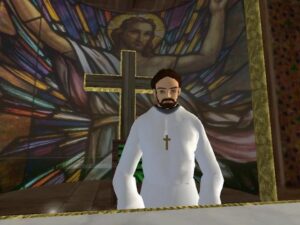Religion in Games
Religion has provided the inspiration and subject matter for countless books, films and plays for many years, and continues to do so to this day. It makes fundamental claims about philosophy and ethics that have attracted fervent criticism and praise in almost every form and from almost every possible direction in recent years. So with all this in mind, why have we not seen more games that deal directly with the issues surrounding faith and religious belief? Well aside from the fact that, for reasons beyond my comprehension, it is somewhat of a taboo to openly criticise religion intellectually or artistically (an immunity that all other forms of discourse are completely free from), the last ten or so years have shown that mainstream developers will invariably get bombarded with complaints and criticism that is mostly generated by an extremely vocal and hostile minority claiming to represent the views of people of faith worldwide, should they attempt to do so. The ensuing controversy results in developers being forced to tip-toe their way around issues surrounding faith or even avoid engagement with them at all, out of a needless fear of causing ‘offence’.

The makers of Hitman 2, for instance, were forced to rerelease an altered version of the game after the original sparked controversy over a level in which Sikh guards were being killed within a depiction of the Harmandir Sahib, a Sikh holy site. More recently, Resistance: Fall of Man was protested by the Church of England for including a gun battle in Manchester Cathedral. Legal threats were levelled at Sony by the Church, who demanded a formal apology, a substantial donation and complete withdrawal of the game purely because they considered the depiction of the Cathedral to be ‘desecration’. Thankfully, Sony did not capitulate. The attitude of the media at the time, however, in paying too much in the way of lip service to the ludicrous accusations and demands of the Church has somewhat neutered the industry and helped to discourage many other developers from using explicit religious imagery in their titles. If major producers are getting their wrists slapped for merely depicting religious symbols or using ‘holy sites’ as the setting for certain scenes, then the industry has no hope of engaging with religious faith on a sophisticated level in the same way as cinema or literature.

Of course these kinds of themes and materials must be dealt with appropriately, and abominations like Ethnic Cleansing and Muslim Massacre only end up contributing to the stigma that games can’t deal with them seriously and objectively. Equally damaging, however, are the ‘religious-games developers’ who attempt to force gratuitous religious messages into their games and essentially proselytise their audience, which merely serves to attract ridicule and ultimately deter other developers from even trying to engage critically with faith. TwoGuysSoftware’s (now known as XcrucifiX) Eternal War: Shadows of Light, for example, is just a poorly disguised recruitment drive that has a deviously brainwashy feel to it. The attempt to involve religion more directly does deserve some credit, but when implemented with such an overtly Christian agenda it not only detracts from the level of enjoyment possible but serves to alienate the mass audience, who are largely unconcerned with the bogus moral values of religion being snuck into their gaming experience.
Where is the middle ground then? On the one hand you have some peripheral developers placing religion at the centre of the experience and essentially creating interactive propaganda, and on the other there are the mainstream developers who are terribly afraid of overtly trespassing on religious subject matter out of fear of incurring a lawsuit. Clearly there is not a market for the former, but there is a serious deficiency in the mainstream industry of genuinely creative, objective and dispassionate exploration of religious issues and the problems they have caused and still cause in today’s world.
Assassin’s Creed is a case in point. Although most would argue that the Crusades were considerably political or territorial in nature, I found it frustrating how the extraordinarily fundamental role of religion in the conflict and its pervasive presence in medieval society was forcibly pushed into the background as to be almost indiscernible. This was particularly damaging for a game which was specifically criticised for its lack of depth and the unconvincing nature of the world it created. Had the developers reflected in the game how religiously charged society was in the 12th century and not treated the issue so sensitively it would have gone some way to alleviating this and adding a certain level of believability to their depictions of Damascus, Acre and Jerusalem, which were, at the time, religious centres of the world.

With the political, ethical and metaphysical issues surrounding religion becoming more salient since the 9/11 bombings and the rise of ‘New Atheism’, developers are going to find themselves increasingly constrained in the kinds of contemporary issues they are able to engage with creatively if such a hugely significant subject remains untouchable. We have come a long way from the early 90s, where a game with even the slightest religious reference was heavily censored, but until religion is placed back on the table of rational discourse and criticism, video games as a creative medium will continue to be taken less seriously than other forms of entertainment. Authors and filmmakers seem to have a lot more courage when it comes to critically and objectively examining religion and if games developers can follow the example set by people like Salman Rushdie, Geert Wilders or Kevin Smith, it will just be a matter of time before the gaming medium will grow to a similar level of maturity and sophistication, which it undoubtedly has the potential for.